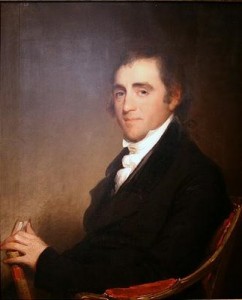 The LORD spoke to Moses, saying, “Make two silver trumpets. Of hammered work you shall make them, and you shall use them for summoning the congregation and for breaking camp. And when both are blown, all the congregation shall gather themselves to you at the entrance of the tent of meeting. But if they blow only one, then the chiefs, the heads of the tribes of Israel, shall gather themselves to you. When you blow an alarm, the camps that are on the east side shall set out. And when you blow an alarm the second time, the camps that are on the south side shall set out. An alarm is to be blown whenever they are to set out. But when the assembly is to be gathered together, you shall blow a long blast, but you shall not sound an alarm. And the sons of Aaron, the priests, shall blow the trumpets. The trumpets shall be to you for a perpetual statute throughout your generations. And when you go to war in your land against the adversary who oppresses you, then you shall sound an alarm with the trumpets, that you may be remembered before the Lord your God, and you shall be saved from your enemies. On the day of your gladness also, and at your appointed feasts and at the beginnings of your months, you shall blow the trumpets over your burnt offerings and over the sacrifices of your peace offerings. They shall be a reminder of you before your God: I am the LORD your God.”
The LORD spoke to Moses, saying, “Make two silver trumpets. Of hammered work you shall make them, and you shall use them for summoning the congregation and for breaking camp. And when both are blown, all the congregation shall gather themselves to you at the entrance of the tent of meeting. But if they blow only one, then the chiefs, the heads of the tribes of Israel, shall gather themselves to you. When you blow an alarm, the camps that are on the east side shall set out. And when you blow an alarm the second time, the camps that are on the south side shall set out. An alarm is to be blown whenever they are to set out. But when the assembly is to be gathered together, you shall blow a long blast, but you shall not sound an alarm. And the sons of Aaron, the priests, shall blow the trumpets. The trumpets shall be to you for a perpetual statute throughout your generations. And when you go to war in your land against the adversary who oppresses you, then you shall sound an alarm with the trumpets, that you may be remembered before the Lord your God, and you shall be saved from your enemies. On the day of your gladness also, and at your appointed feasts and at the beginnings of your months, you shall blow the trumpets over your burnt offerings and over the sacrifices of your peace offerings. They shall be a reminder of you before your God: I am the LORD your God.”
via Numbers 10 – ESVBible.org.
I couldn’t help but think of Susan’s horn when I read this passage. The idea of a signal device that guarantees and promises that you will gain the attention of a rescuer is a powerfully attractive kind of “magic.”
But I worry about the ESV’s choice in verse 10 to sayd that the trumpets “shall be a reminder.” As the context makes clear, the one being reminded is not the person blowing or the human persons hearing the trumptes. God is reminded to act! I think a better translation might have been “memorial.” God is reminded of his covenant promises and is thus prodded to act on them.
I think we avoid talking this way because it seems to detract from the omni-power of deity. But, look, just praying does that, to our minds, and God wants us to pray and promises that he, yes, responds, to our prayers. It is not up to us to extrapolate from our imaginations what God’s experience as an omniscient being must be like. He says that we are like him and that the way we respond to heartfelt requests from our children is similar to his own experience. We are in no place to second guess Him on this point.
And when God remembers, he acts. A couple of examples:
But God remembered Noah and all the beasts and all the livestock that were with him in the ark. And God made a wind blow over the earth, and the waters subsided.
During those many days the king of Egypt died, and the people of Israel groaned because of their slavery and cried out for help. Their cry for rescue from slavery came up to God. And God heard their groaning, and God remembered his covenant with Abraham, with Isaac, and with Jacob. God saw the people of Israel—and God knew.
So God is reminded in many places in Scripture. And we forget and switch it all around. How many Christians have been told that the rainbow is designed to remind us of God’s promise not to destroy the world in a flood? But…
Then God said to Noah and to his sons with him, “Behold, I establish my covenant with you and your offspring after you, and with every living creature that is with you, the birds, the livestock, and every beast of the earth with you, as many as came out of the ark; it is for every beast of the earth. I establish my covenant with you, that never again shall all flesh be cut off by the waters of the flood, and never again shall there be a flood to destroy the earth.” And God said, “This is the sign of the covenant that I make between me and you and every living creature that is with you, for all future generations: I have set my bow in the cloud, and it shall be a sign of the covenant between me and the earth. When I bring clouds over the earth and the bow is seen in the clouds, I will remember my covenant that is between me and you and every living creature of all flesh. And the waters shall never again become a flood to destroy all flesh. When the bow is in the clouds, I will see it and remember the everlasting covenant between God and every living creature of all flesh that is on the earth.” God said to Noah, “This is the sign of the covenant that I have established between me and all flesh that is on the earth.”
And we are told that Passover was a celebration that reminded the Israelites. I’m sure it did. But is that given to us as the primary purpose of the reminding?
For I will pass through the land of Egypt that night, and I will strike all the firstborn in the land of Egypt, both man and beast; and on all the gods of Egypt I will execute judgments: I am the Lord. The blood shall be a sign for you, on the houses where you are. And when I see the blood, I will pass over you, and no plague will befall you to destroy you, when I strike the land of Egypt. “This day shall be for you a memorial day, and you shall keep it as a feast to the Lord; throughout your generations, as a statute forever, you shall keep it as a feast.
Plainly, God meant when he said that the blood “shall be a sign for you,” he meant it was to be a sign for them to use to show God so he did not strike them. And thereafter, the blood of all the passover lambs was put on the altar at the central sanctuary that God had the Israelites build for him in the wilderness. So the blood always was directed toward God for him to respond to.
We don’t have the authorized trumpets any more, but the trumpets simply represented the voice of the people (preeminently the voice of Jesus himself, which is like a trumpet (Revelation 1.10; 4.1–note the voice calls John into heavenly worship). We remind God of who we are and what he has promised by using the name of Jesus. And we have his supper to remind him to keep covenant with us. If I may offer what I think is a slightly better translation from 1 Corinthians 11 (using the ESV’s footnotes!):
For I received from the Lord what I also delivered to you, that the Lord Jesus on the night when he was betrayed took bread, and when he had given thanks, he broke it, and said, “This is my body which is for you. Do this as my memorial” In the same way also he took the cup, after supper, saying, “This cup is the new covenant in my blood. Do this, as often as you drink it, as my memorial.” For as often as you eat this bread and drink the cup, you proclaim the Lord’s death [to the Father?] until he comes.
 In Acts 15 Peter speaks to an assembly about God’s election of him,
In Acts 15 Peter speaks to an assembly about God’s election of him,






